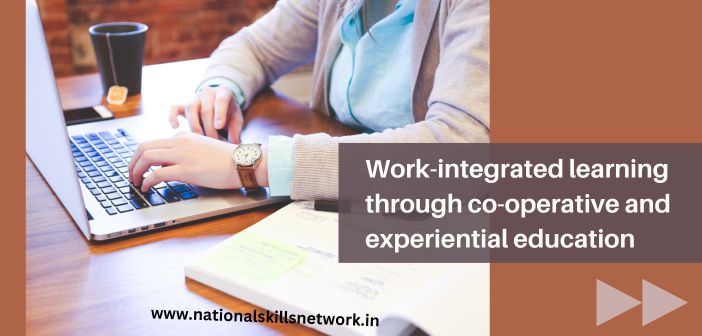
“The multifaceted benefits of work-integrated learning position it as a pivotal pedagogical approach. It not only facilitates a profound understanding of academic concepts but also enhances employability outcomes and fosters a mutually beneficial exchange of knowledge between students and workplaces,” says Dr. Norah McRae, Associate Provost, Co-operative and Experiential Education, Adjunct Faculty Member, Department of Psychology, WACE Secretariat, University of Waterloo.
To learn more about different perspectives on education through work-integrated learning, enhancing employability skills, exploring strategies for creating a supportive environment for WIL in India, the global quality framework, and experiential learning, we spoke with Dr. Norah McRae, Associate Provost, Co-operative and Experiential Education, Adjunct Faculty Member, Department of Psychology, WACE Secretariat, University of Waterloo.
Below are a few excerpts from our conversation. You can watch the full video on our YouTube channel.
Q. How would you assess the global importance of work-integrated learning in addressing the current needs of the world?
A. After dedicating many years to work-integrated learning, I remain continually impressed by the profound outcomes achievable through its effective implementation. The primary and foremost objective of engaging in work-integrated learning is to enable students to deepen their comprehension of theoretical knowledge acquired in the classroom. The invaluable hands-on experience facilitates a genuine appreciation for the concepts learned.
Beyond the foundational purpose of enhancing understanding, work-integrated learning contributes significantly to employability. The application of knowledge and the development of skills within a workplace setting directly translate into positive employability outcomes. This holds true across various disciplines, underscoring the universal impact of work-integrated learning.
Furthermore, organizations hosting students during work-integrated learning experiences also reap substantial benefits. The contributions of students, infused with their talents and capabilities, have a phenomenal impact on organizations, whether within industry sectors, non-profit entities, or the public sector. Students bring a wealth of innovative ideas and skills that invigorate and enrich the work environment.
In the context of our rapidly evolving technological landscape, work-integrated learning extends beyond students learning from employees. And employees gain insights and knowledge from students, who bring fresh perspectives, digital skills, and emerging technologies into workplaces. This mutual learning helps the organization adapt better to new technologies.
Q. Please share your expertise in implementing work-integrated learning, especially at the school level,l with vocational courses in India, drawing from global insights, including experiences in Canada.
A. Creating an ideal environment for work-integrated learning involves recognizing key stakeholders.
In Canada, the quality framework centers on five key stakeholders:
- Government
- Institution
- Educators
- Students
- Employers or external organizations
To establish conditions for a program, the initial step is to understand the goals of each stakeholder and address their specific needs. The government often prioritize employability; employers seek talent; educators aim for increased student engagement and skill development; and institutions focus on recruitment, retention, and reputation.

Students are interested in opportunities for work, career progression, and a deeper understanding of their studies. Achieving success involves a holistic approach tailored to each context, considering the diverse interests of all stakeholders. Creating environments that align with these objectives sets the stage for a robust ecosystem supporting work-integrated learning. It’s crucial to move beyond ad-hoc efforts, especially during the initial stages, and involve all relevant players in the process. Engaging parents, understanding their expectations, and aligning the program with their needs can further enhance support for students. Once these considerations are in place, addressing structural, resource, and programming aspects becomes essential for a well-rounded and effective work-integrated learning initiative.
Q. Could you share some suggestions for addressing conflicts when society, student, government, and industry interests diverge in the context of work-integrated learning?
A. For effective leadership in a work-integrated learning program, it’s crucial to define key goals and driving forces. Emphasizing quality programming is paramount, guided by the PEAR framework—Pedagogy, Experience, Assessment, and Reflection. This ensures that learning outcomes are linked to meaningful experiences, assessed in alignment with program and institutional goals, and accompanied by meaningful reflection. When stakeholders suggest alternative approaches, the PEAR framework serves as a reference to maintain quality boundaries.
Flexibility is another key aspect, allowing for diverse experiences, durations, and operational models that meet the varied needs of stakeholders. A flexible approach accommodates the preferences of students, the requirements of academic programs, and the expectations of industry sectors. While it’s impossible to satisfy every need, clarity on guiding principles, such as the quality framework, combined with a flexible mindset, helps navigate competing interests among stakeholders. Understanding the priorities for the program and institution becomes central to success.
Q. How do you define experiential education, and is it similar to gaining practical work experience, such as through apprenticeships or internships?
A. Experiential education is a broad umbrella encompassing hands-on learning like problem-solving, labs, and case-based solutions. Work-integrated learning is a subset distinguished by the involvement of a third party, such as a company or employer, with shared goals. This external partnership co-creates learning experiences, emphasizing employability and job readiness. Rooted in John Dewey’s philosophy of deepening education, work-integrated learning aligns with Canadian models like apprenticeships, cooperative education, and applied research. The National Association, CEWIL (Cooperative Education and Work-Integrated Learning Canada), provides clarity with defined terms and nine models, facilitating collaboration within the Canadian higher education system. For further details, the CEWIL website offers comprehensive definitions and models.
Q. Could you please share your role in WACE’s co-operative education program, and for those who are interested, how can they join and explore collaboration opportunities?
A. World Association of Cooperative & Work-Integrated Education (WACE) is a global association comprising individuals from diverse higher education institutions worldwide, primarily focused on work-integrated learning. Scholars and practitioners engaged in research and leadership roles form a collaborative community, addressing common challenges and sharing insights. Membership is open, and WACE hosts various events, including the upcoming one in Sweden in June, particularly tailored for researchers. The association is known for its welcoming and collaborative nature.
Also read: Work-integrated learning (WIL) in higher education and scope for better employability
WACE is developing a global quality framework for work-integrated learning and collecting insights from national associations worldwide. Given the discussion on India’s National Education Policy (NEP), exploring this framework might provide valuable perspectives. WACE invites participation and contributions to this evolving global document, aiming to guide individuals, especially from regions without existing associations. Engaging with WACE offers opportunities for learning and collaboration with like-minded individuals striving to enhance work-integrated learning practices.












